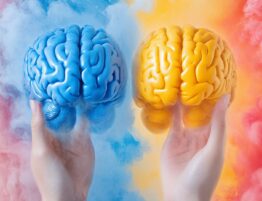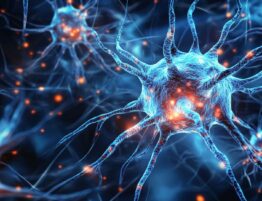The relationship between hormones and neurological health is an important area of research. Hormones regulate bodily work and cause specific effects by many factors. They are crucial in impacting our:
- Brain development.
- Emotions.
- Mind.
- Well-being.
Understanding this connection is vital. It’s for keeping optimal wellness and making effective treatment for issues.
Our article will delve into the interplay between those two factors. We will explore how imbalance can impact our body operation. We will speak about the specific roles of many endocrine agents. It includes those like estrogen, testosterone, cortisol, and thyroid. Also, we will examine the potential implications of imbalances for body ailments.
Can Hormone Imbalance Trigger Neurological Symptoms?
There is the question: “Can hormone imbalance cause neurological symptoms?” Yes, they can have an impact on our wellness. When their levels become uneven, it can lead to many signs. They often manifest as emotional problems, mental issues, and changes in behavior.
One of the most common signs is anxiety. Changes in cortisol can trigger feelings of anxiety and unease. This one plays a crucial role in our stress response. And when it’s elevated for long periods, it can disrupt the balance of neuro agents in the brain. It leads to anxiety-like signs.
Depression is also a common state linked to cell imbalance in the body. For example, serotonin is often referred to as a “happiness agent”. It plays a vital role in controlling our emotions. When the levels are low, it leads to sadness, hopelessness, and a loss of interest in activities. Also, bad balance in the thyroid also impacts emotions. It then leads to depression. It impacts metabolism and energy.
Mental issues are another potential problem. Estrogen is an agent associated with female reproductive wellness. It plays a role in brain work and mental wellness. Its levels get low during menopause. So, some women may feel difficulties with recalling, concentration, and attention. Similarly, issues in thyroid agents can affect mental work. It leads to brain fog and difficulty thinking clearly.
The Endocrine System’s Role in Neurological Function
How does the endocrine system (ES) affect the nervous system (CNS)? The ES and the CNS are intricately interconnected. They work together to control many processes in our bodies. The ES have the glands. Those make and secrete agents. At the same time, the CNS handles transmitting electrical signals.
Several main agents made by the ES are critical for brain work and behavior. For example, the thyroid gland makes thyroid agents. Those control metabolism and energy levels. These agents also influence:
- Brain development.
- Mental work.
- Emotions.
So, issues can lead to many neural problems. It includes anxiety, depression, and mental problems.
The adrenal glands produce cortisol. This is the stress agent. It’s released in response to worrying. And it helps us to be ready for a fight-or-flight response. This is essential for survival. However, chronic issues and elevated cortisol levels lead to uneven levels of nerve agents. It leads to anxiety, depression, and other issues.
The ES also plays a crucial role in regulating responses. When the body is under stress, a link between the CNS and ES signals the release of cortisol. It helps us to cope with problems by increasing sugar levels, heart rate, and pressure. However, chronic state and excessive cortisol have negative consequences for us.
Hormonal Influence on Behavior and Mood
How do hormones affect behavior? They have a big impact on our behavior and mood. Studies have shown that changes in levels can impact everything. It’s from our emotional state to our decision-making.
One agent that has been extensively studied in relation to emotions and behavior is cortisol. Chronic stress and boosted levels are linked to feelings of:
- Anxiety.
- Depression.
- Irritability.
Also, this agent can change mental work. It makes it difficult to concentrate and learn new info.
Serotonin is often referred to as the “happiness agent”. It’s another important agent. It plays a role in emotion regulation. Low levels are usually connected to depression, anxiety, and aggression. The levels can be influenced by many factors. It includes genes, food, and certain meds.
So, what about hormones and behavior impact factors? Studies have shown the effects of hormonal changes on emotion swings and anxiety. For example, premenstrual syndrome is a common state. It affects many women. And it’s characterized by many signs. It includes emotional swings, irritability, and anxiety. Those issues are partly due to fluctuations in changes during the menstrual cycle.
Also, menopause, a period of hormonal decline in women, can be also associated with emotional changes and anxiety. As estrogen levels get low, some may experience depression, irritability, and difficulty sleeping.
Hormones and Their Impact on Memory and Cognitive Function
How do hormones affect memory? They also play a crucial role in impacting our recalling, studying, and mental abilities. Estrogen and cortisol have significant effects on memory formation and mental processes.
Estrogen is an agent that is usually associated with female reproductive wellness. It’s linked to mental work and recalling. Studies have suggested that it may play a protective role. It helps us to keep mental abilities and cuts the risk of age-related recalling problems. Estrogen levels get low during menopause. So, some women may feel problems with recalling, focus, and attention.
Cortisol is the stress agent. It can also impact recalling and mental work. Chronic stress and boosted levels have been shown to impair memory formation and retrieval. Prolonged exposure to high levels can damage brain cells. And it interferes with the work of the hippocampus. It’s a region that is critical for recalling.
Disbalances can lead to many recalling issues, including:
- Short-term memory loss. Difficulty remembering recent events or info.
- Difficulties with focus. Trouble focusing and paying attention.
- Brain fog. Feeling confused or disoriented.
- Word-finding issues. Struggling to find the right words.
Note that agents can play a significant role in recalling and mental work. However, other factors like age, lifestyle, and underlying medical conditions also contribute to these outcomes. If you are facing memory issues or mental decline, consult with a doctor. It’s to determine the underlying cause and explore potential treatment options.
Understanding How Hormones Affect Neurons
Agents also exert a profound influence on the CNS. They directly interact with neurons and synapses. They can enhance or impair their communication. It impacts our mental abilities, emotions, and behavior.
So, what do some hormones do to neurons? They can impact work in several ways. They can:
- Alter neurotransmitter levels. Agents can control the production and release of neurotransmitters. They’re the chemical messengers that ease communication between neurons. For example, cortisol can increase the levels of certain neurotransmitters. This can lead to heightened arousal and anxiety.
- Modulate synaptic plasticity. Synapses, the junctions between neurons, are not fixed structures. They are capable of changing and adapting in response to experience and activity. Agents can impact synaptic plasticity. They affect how neurons form connections and communicate with each other.
- Influence neuronal growth and survival. Agents can also regulate the growth, development, and survival of neurons. For example, insulin plays a role in brain development and work. Insulin receptors are in the brain, and insulin can promote neuronal growth and survival.
The Commercial Impact of Hormones on Neurological Health
Agents play a crucial role in regulating our mental and neurological health. When their levels are in balance, our brains can work optimally. It leads to improved emotions, cognition, and well-being. Conversely, hormone imbalance can cause neurological symptoms. It includes anxiety, depression, mental decline, and even more serious conditions.
Addressing hormonal imbalances can have a significant impact on neurological health. By restoring hormonal balance, individuals may experience:
- Improved emotions and reduced anxiety. Balanced levels can help regulate emotional responses. And it can reduce feelings of anxiety or depression.
- Enhanced mental work. Agents play a vital role in recalling, concentration, and learning. By addressing hormonal imbalances, individuals may experience improved mental abilities.
- Reduced risk of neural disorders. Maintaining hormonal balance can help reduce the risk of developing neural conditions. Those are Alzheimer’s disease and Parkinson’s disease.
- Improved quality of life. By addressing hormonal imbalances, you can experience a significant improvement in life.
However, no matter what hormones and behavior impact factors are. The proper place for your wellness is what matters. At our clinic, we’re committed to providing you with the highest quality services. Those are always tailored to your unique needs. Our team of dedicated med pros is passionate about helping you achieve optimal well-being.
Why Choose Us?
- Comprehensive Care. From routine check-ups to specialized treatment, we offer a wide range of services. They are to meet your needs.
- Personalized Approach. Our docs take the time to understand your individual concerns. And they develop customized treatment plans.
- State-of-the-Art Facilities. Our clinic has the latest med technology. It ensures accurate diagnoses and effective treatment.
- Compassionate Care. Our staff is dedicated to providing compassionate and empathetic care in a welcoming environment.
Ready to experience the difference? Schedule an appointment today. And discover the benefits of choosing as your trusted med provider.













Please, leave your review
Write a comment: